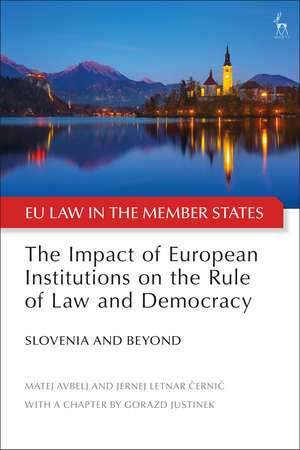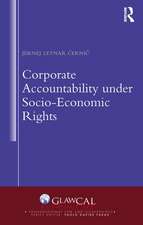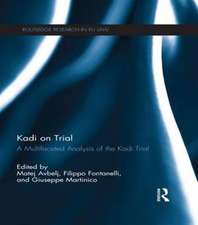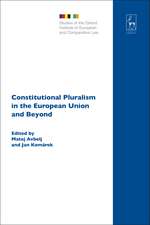The Impact of European Institutions on the Rule of Law and Democracy: Slovenia and Beyond: EU Law in the Member States
Autor Matej Avbelj, Jernej Letnar Cernicen Limba Engleză Hardback – 29 apr 2020
Preț: 541.71 lei
Preț vechi: 774.78 lei
-30% Nou
Puncte Express: 813
Preț estimativ în valută:
103.65€ • 108.52$ • 85.77£
103.65€ • 108.52$ • 85.77£
Carte disponibilă
Livrare economică 15-29 martie
Preluare comenzi: 021 569.72.76
Specificații
ISBN-13: 9781509915057
ISBN-10: 1509915052
Pagini: 320
Dimensiuni: 156 x 234 x 22 mm
Greutate: 0.62 kg
Editura: Bloomsbury Publishing
Colecția Hart Publishing
Seria EU Law in the Member States
Locul publicării:London, United Kingdom
ISBN-10: 1509915052
Pagini: 320
Dimensiuni: 156 x 234 x 22 mm
Greutate: 0.62 kg
Editura: Bloomsbury Publishing
Colecția Hart Publishing
Seria EU Law in the Member States
Locul publicării:London, United Kingdom
Caracteristici
Challenges the accepted orthodoxy that Slovenia is one of the success stories of New Europe member states
Notă biografică
Matej Avbelj is Professor of European Law and Jernej Letnar Cernic is Associate Professor of Human Rights Law, both at the Faculty of Government and European Studies, New University, Slovenia.
Cuprins
1. Constitutional Backsliding in Central and Eastern Europe in Lieu of Back to Europe I. Introduction II. The Argument of this Book III. Acknowledgments 2. The Genesis of Slovenian Constitutional Democracy I. A People that Came from NowhereII. The Road to Independence and Construction of a New Constitutional Legal Order III. Slovenia as a Constitutional Democracy IV. The Sociology of Slovenian Constitutional Order V. A Semi-Permanent Transition and the New Normal 3. Historical Reasons for Failures of the Rule of Law and Constitutional Democracy in Slovenia I. Introduction II. The Pitfalls of the Past III. Transitional Justice Measures IV. The Impact of the Unresolved Past on the Rule of Law and Democracy V. Conclusion 4. The (Non) Reforms of Slovenia's Economy I. Introduction II. Slovenia's Economy in the 19th and the Early 20th Century III. The Centrally Planned Times of the SFRY and the Pretransition Era IV. State of Play after Independence V. The Crash: The 2008 Global Financial Crisis VI. Differences in Some Policies VII. Analysis of Different Economic Concepts VIII. Conclusion 5. The Current Crises of Human Rights Protection, the Rule of Law and Democracy in Slovenia I. Introduction II. The Current Crises of Human Rights Protection in Slovenia III. The Current Crises of the Rule of Law and Constitutional Democracy in Slovenia IV. Theorising Reasons for the Current Crises of the Rule of Law and Constitutional Democracy in Slovenia V. Conclusion 6. The Judiciary and the Rule of Law in Slovenia I. Introduction II. Systemic Violation of the Right to a Trial in a Reasonable Time III. Challenges to Judicial Independence IV. Impartiality of the JudiciaryV. Ordinary Courts and Human Rights ProtectionVI. Distrust of the JudiciaryVII. Conclusion 7. The Vicious Circle of Slovenian Democracy I. Introduction II. Three Crises of Input Legitimacy III. The Crisis of Throughput Democratic Legitimacy IV. The Crisis of Output Legitimacy V. Conclusion 8. Freedom of Press under Stress in Slovenia I. Introduction II. The Constitutional and Institutional Frameworks of Press Freedom in Slovenia III. Freedom of the Press under Stress in Slovenia IV. Overall Assessment V. Conclusion 9. Welfare State and Solidarity in Slovenia I. Introduction II. (In)equality, Equal Capabilities and Socioeconomic Livehoods in Slovenia III. The Normative Protections of Welfare State and Socioeconomic Rights in Slovenia IV. Regional Inequality in Slovenia V. The Impact of Weak Rule of Law and Constitutional Democracy on the Level of Welfare State andSocioeconomic Rights in Slovenia VI. The Future of the Welfare State and Human Development in Slovenia VII. Conclusion 10. The Influence of the Council of Europe on the Rule of Law in Slovenia I. Introductory Remarks II. The European Commission for Democracy through Law III. The Commissioner for Human Rights of the Council of Europe IV. The European Court of Human Rights V. Conclusion 11. The Impact of the European Union on Constitutional Democracy in Slovenia I. Pre-Accession Phase II. Poster-Child Membership Phase III. Post-Crisis Phase IV. Conclusion 12. The Case for a Resilient Constitutional Democracy I. The Concentric Circles of Western Democratic Decay II. In Pursuit of a Resilient Constitutional DemocracyIII. Why is the East More Fragile than the West? IV. Democratic and Academic Decay V. Making the Case for a Resilient Constitutional Democracy VI. What Can the Council of Europe Add to its Existing Activities to Strengthen the Resilience of ConstitutionalDemocracy in CEE Countries? VII. By Way of Conclusion: Concrete Proposals for the Reform of Slovenia's Constitutional Democracy
Recenzii
Avbelj and Letnar Cernic's book is the first monographic treatment of the rule of law and the state of democracy in Slovenia in legal scholarship. As such, it makes a welcome contribution to the academic literature . the authors should be commended for accurately diagnosing and giving a name to a phenomenon that has long plagued the Slovenian legal system, that is, an extreme 'institutional attachment to a statutory-based legal positivism' [and] their doctrinal analysis of the concept of a resilient democracy in the EU is outstanding.

























